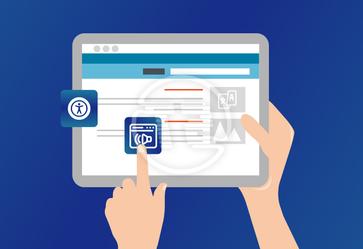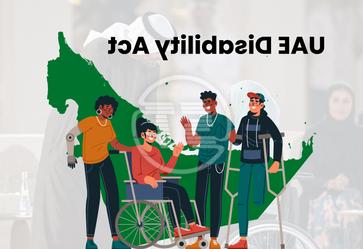In recent years, India has taken significant strides toward promoting the rights and inclusion of persons with disabilities (PwDs), marking a shift from a welfare-based approach to one grounded in empowerment and human rights. In a world where digital platforms are central to daily life, online access to information and services has become an essential right. However, for persons with disabilities, digital access is often limited due to various barriers.
India’s Rights of Person with Disabilities (RPD) Act of 2016 marks a significant step forward in bridging the gap by promoting inclusivity in both physical and digital spaces. This landmark legislation emphasizes the need for accessible digital environments, helping to create a more inclusive society where everyone can participate equally in the digital age.
Understanding the RPD Act, 2016!
The RPD Act, 2016, which replaced the Persons with Disabilities Act of 1995, was introduced to align India’s disability rights framework with the United Nations Convention on the Rights of Persons with Disabilitiess (UNCRPD), to which India is a signatory. The Act expands the definition of disability from seven categories to twenty-one, including conditions like autism, cerebral palsy, multiple sclerosis, chronic neurological conditions, and mental illnesses. This broadening of scope enables more individuals to access legal protections and government benefits.
The primary aim of the RPD Act is to foster a society in which people with disabilities have access to equal rights, comprehensive protections, and genuine social inclusion. The law emphasizes non-discrimination in various areas, including education, employment, healthcare, and public accessibility.
Highlights of the Act for ensuring accessibility!
The RPD Act recognizes digital accessibility as a critical component of inclusion. Here are some of the main provisions of the Act on digital accessibility:
Accessibility standards for websites and applications
The Act mandates that all government websites and applications must comply with global digital accessibility standards, specifically the Web Content Accessibility Guidelines (WCAG) - developed by the World Wide Web Consortium (W3C), provide a framework for making digital content accessible for people with a range of disabilities, including visual, auditory, physical, and cognitive impairments.
Equal access to online services
Government portals that provide essential services, such as healthcare, education, financial assistance, and more are required to ensure that all individuals can access their desired services without encountering any barriers. This provision encourages developers to design websites that are compatible with screen readers, offer text alternatives for images, provide easy navigation, and include features to assist users with different needs.
Inclusive communication channels
The RPD Act promotes the use of inclusive communication channels, requiring that websites, applications, and other digital platforms provide options for diverse methods of engagement. For example, video content must include closed captioning for the hearing-impaired, while voice-activated services benefit users with limited physical mobility. This emphasis on varied communication methods ensures more inclusive interactions online.
Audits and compliance checks
To ensure that digital spaces remain accessible, the RPD Act recommends regular accessibility audit for government websites and applications. By requiring periodic assessments, the law aims to maintain digital environments that are continuously improving and meeting accessibility standards.
Incentivizing private sector accessibility
Although the Act primarily mandates accessibility in public sector platforms, it also encourages private businesses to adopt accessibility standards. Through incentives, the government hopes to encourage private organizations to create accessible digital experiences, recognizing that inclusivity across all online spaces is essential for a truly accessible digital ecosystem.
Challenges in achieving fully digital accessibility!
While the RPD Act has laid a strong foundation for digital accessibility, challenges remain:
Inconsistent implementation
Despite the Act’s mandates, not all government websites and applications fully comply with accessibility standards. Implementation can be inconsistent, particularly in smaller cities and rural areas, where resources and technical expertise may be limited.
Lack of awareness among private organizations
Although the RPD Act encourages private entities to adopt accessibility standards, many businesses are still unaware of or reluctant to implement digital accessibility measures. Without adequate incentives or regulatory pressure, some private organizations may not prioritize accessibility, limiting the Act's impact on the broader digital ecosystem.
Resource constraints
Achieving full compliance with digital accessibility standards can be costly, especially for smaller organizations. Access to funding and resources is essential to ensure that all platforms can afford to implement these standards, regardless of their budget constraints.
Need for continuous upgrades and maintenance
Digital accessibility is not a one-time fix; it requires regular updates and maintenance as technology evolves. Many websites may initially comply with accessibility standards but may become inaccessible over time without periodic reviews and improvements.
Impact of the RPD Act on digital accessibility!
The RPD Act has catalyzed several positive changes, fostering a culture that prioritizes accessibility in digital development. Some of the most notable impacts include:
- Greater awareness of digital inclusion among government agencies and tech/non-tech companies.
- Increased accessibility of digital products and services across the industries.
- Advancements in assistive technology. Voice-recognition software, screen readers, Braille displays, and other assistive devices are more widely available now.
- Organizations have included accessibility training in their tech teams’ development practices to ensure accessible digital products.
- Expanded reach of online education.
Wrapping up
The RPD Act is a progressive piece of legislation that highlights India’s commitment to inclusivity in the digital age. By mandating digital accessibility, the Act ensures that individuals with disabilities have the opportunity to engage independently in online spaces and access critical information and services. While challenges persist, the momentum generated by the Act is a positive step toward a digitally inclusive Indian.
Continued efforts to strengthen implementation, raise awareness, and collaborate across sectors will be vital to realizing a future where digital accessibility is a fundamental standard, benefiting all members of society equally.
Kick start accessibility journey with All in One Accessibility® Supports 140+ languages including Hindi, Bengali, Persian, Punjabi, Assamese, Gujarati, Kannada, Marathi, Odia (Oriya), Sanskrit, Sindhi, Tamil, Telugu, Urdu, Bhojpuri, Dogri, Konkani, Maithili, Meiteilon (Manipuri), Mizo, and more.
The rights of persons with disabilities act (RPD) emphasizes the importance of creating inclusive environments. We help businesses comply with accessibility standards through All in One Accessibility® and comprehensive & custom website accessibility remediation services include WCAG manual audit, manual remediation, PDF / document accessibility remediation, consulting, VPAT report / ACT, app accessibility remediation, ongoing monitoring, and support. As it is mandatory to comply with accessibility standards; Government, schools, colleges, universities, banking and financial services, healthcare, retail, ecommerce, public utility companies, and law firms must prioritize accessibility to foster inclusivity and equal access. Reach out [email protected] or request a free quote!


